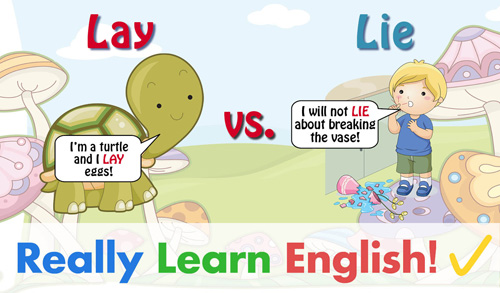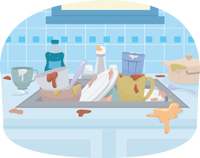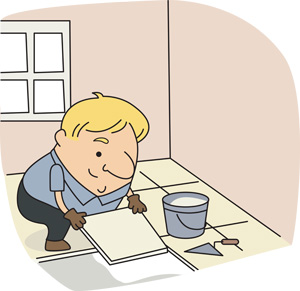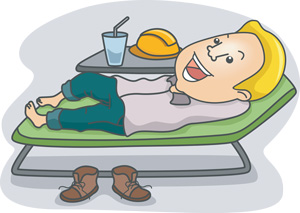Lay vs. Lie
What is the difference?
The words lay and lie are commonly very problematic for both non-native and native English speakers. The problem is in both their definitions and their use in the past tense. These two words can be very confusing, so don't worry if you find yourself having problems with them. You aren't alone!

Click Here for Step-by-Step Rules, Stories and Exercises to Practice All English Tenses
Lay
Lay is usually used as a verb, and here is where problems occur.
Lay as a verb means to put an object down on a surface, or to put something in a place of rest. When you lay something down, it often means you are doing it carefully or gently.

Lay can be problematic because its spelling is different in the past tense. In the past tense, lay becomes laid. (In the same way that pay becomes paid.)
Examples:
- I will lay the papers on your desk when I am finished with them.
(I will set the papers on your desk when I am finished with them.)

- Your server will lay the bread on your table.
(Your server will put the bread on your table.)

- Stephan thought he had laid his hat on the counter.
(Stephan thought he had put his hat on the counter.)

- I laid down in bed yesterday and had a long nap.
(I got in my bed yesterday and had a long nap. )

- The boys are laying the hardwood in their new house today.
(The boys are putting down the hardwood in their new house today.)

If an animal lays eggs, it produces them.
Examples:
- Our chicken lays one egg per day.
(Our chicken produces one egg every day.)

- Some fish lay just a few eggs, while others lay tens of thousands.
(There are fish that produce only a few eggs, while others may produce tens of thousands.)

- Turtles lay eggs too.
(Turtles also produce eggs.)

Collocations
Collocations are commonly spoken phrases in English that occur naturally in speech. Becoming familiar with collocations will allow you to speak naturally with others and provide smooth dialogue in conversations.
Lay Collocations
- Lay carefully/gently
- Carefully lay the vase down.
- Gently lay the vase down

- Lay down/on/over
- I'm going to lay down after work.
- "Lay down!" Sarah told her dog.
- "Lay it over on the counter," my boss told me.

Lie
As a noun, lie is fairly easy to use and understand.
A lie is a false statement. If someone says something that is not true, they are telling a lie.
Examples:
- Jeff told his mother a lie because he didn't want to get in trouble.
(Jeff didn't tell his mother the truth because he didn't want to get in trouble.)

- Sarah didn't want to tell Jennifer that she had fallen down and ripped Jennifer's dress so she told a lie.
(Sarah didn't want to tell Jennifer that she had fallen down and ripped Jennifer's dress so she didn't tell her the truth.)

However, lie as a verb causes many problems for people. Let's see why.
While lie as a noun is a false statement being told, lie as a verb is the act of telling that false statement. Let's look at some more examples to help us understand.
Examples:
- Jessica lied to her friend and now she felt guilty.
(Jessica wasn't honest to her friend and now she felt guilty.)

- My mother tells me that I should never lie.
(My mother tells me that I should always be honest.)

- I was taught in school that lying is not very nice.
(I was taught in school that not being honest is not very nice.)

Lie as a verb can also mean to be in a horizontal position. So to lie down is to get into a horizontal position. If you are getting in a resting position, you are going to lie down.
The past tense of lie is lay. This is where these two words cause lots of problems for people!
Examples:
- Lois is going to lie down after school because she is very tired.
(Lois is going to get in a resting position after school because she is very tired.)

- The girls were lying down together and watching a movie.
(The girls were all horizontal together and watching a movie.)

- The dog lay on the floor while Ted washed dishes.
(The dog was resting on the floor while Ted washed dishes.)

Lie Collocations
- Lie down
- I'm going to lie down.
- The dog will lie down when it gets home from its walk.

- Lie on
- Sarah will lie on her bed when she gets home.
- Mom doesn't like to lie on her clean blankets.

- Lie about
- My friend lies about when she gets home from school.
- Sundays are meant for lying about and being lazy.

More Tips
The words tend to cause trouble for native English speakers and new English speakers.
The trouble is in their similar meanings. If we focus on the definitions of positions of rest, there is one trick that we can use to tell the difference.
The word lay requires a direct object. Lie does not.
For example, in the sentence "I lay the book on the table," the book is the direct object. In the sentence, "I lie down on the sofa," there is no direct object.
Summary Table
Verb |
Present Form |
Past Form |
Third Form |
ING Form |
lay to place gently in a flat position or to place into position
|
lay |
laid |
laid |
laying |
lie to be in or get into a flat position on a surface
|
lie |
lay |
lain |
lying |
A Story to Practice Lay vs. Lie
Jack was supposed to do his homework and lay it on his teacher's desk. But Jack didn't do his homework so Jack lies to his teacher. Jack says, "I did lay my homework on your desk!"
"Well why is it not lying there now, Jack?" his teacher asks him.
"I don't know. Maybe someone stole it!" Jack lies. Jack feels strange when he lies. He gets a bad feeling in his stomach. Jack decides that he does not like lying, but he is too embarrassed to tell his teacher the truth. Jack is caught in his lie.
His teacher shuffles some of the papers that other students laid on her desk. She says, "I don't think anyone would steal your homework, Jack. Everyone else's homework is lying here."
Jack blushes and looks to the floor. He feels bad because he lied to his teacher. "I'm sorry," he says. "I lied to you! I didn't lay my homework on your desk because I never did my homework! I promise I will do it tonight."
"Okay, Jack. But please do not lie anymore. Lying is a very bad habit!" his teacher tells him. Jack feels better that he has told the truth and decides he will not lie anymore.

Quiz
Fill in the blanks with the appropriate word. Each question is worth ten points.
- I __________ (lied / laid) to my mother because I didn't want to go to school.
- Sarah's dog took the bone she __________ (lied / laid) on the floor.
- You should __________ (lay / lie) the phone on the counter when you are finished with it.
- I hate __________ (lying / lieing) because it makes me feel guilty.
- Everyone tells little __________ (lies / lays) from time to time.
- I love __________ (lying / laying) down when I'm lazy.
- When you're finished with the books, __________ (lay / lie) them in the shelf.
- The fruit __________ (lie / lay) in the bowl where she left them.
- I am going to __________ (lie / lay) down for a bit.
- My little brother __________ (lies / lays) to our mother.
Answer Key
1. lied | 2. laid | 3. lay | 4. lying | 5. lies | 6. lying | 7. lay | 8. lay | 9. lie | 10. lies
Get Updates, Special Offers, and English Resources
Download your FREE GIFT (the first two chapters of
English Short Stories Book and Workbook)
as soon as you join!

By submitting your email, you consent to receiving updates and newsletters from us and to the sharing of your personal data with third parties for the purposes of sending you communications. We will not spam you. You can unsubscribe at any time. For more information, please see our privacy policy.







